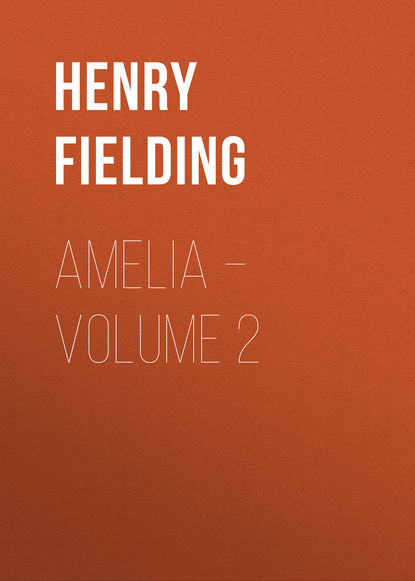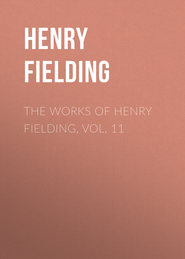По всем вопросам обращайтесь на: info@litportal.ru
(©) 2003-2024.
✖
Amelia – Volume 2
Настройки чтения
Размер шрифта
Высота строк
Поля
Booth now greatly lamented that he had writ to his wife. He thought she might have been acquainted with the affair better by the serjeant. Booth begged him, however, to do everything in his power to comfort her; to assure her that he was in perfect health and good spirits; and to lessen as much as possible the concern which he knew she would have at the reading his letter.
The serjeant, however, as the reader hath seen, brought himself the first account of the arrest. Indeed, the other messenger did not arrive till a full hour afterwards. This was not owing to any slowness of his, but to many previous errands which he was to execute before the delivery of the letter; for, notwithstanding the earnest desire which the bailiff had declared to see Booth out of his troubles, he had ordered the porter, who was his follower, to call upon two or three other bailiffs, and as many attorneys, to try to load his prisoner with as many actions as possible.
Here the reader may be apt to conclude that the bailiff, instead of being a friend, was really an enemy to poor Booth; but, in fact, he was not so. His desire was no more than to accumulate bail-bonds; for the bailiff was reckoned an honest and good sort of man in his way, and had no more malice against the bodies in his custody than a butcher hath to those in his: and as the latter, when he takes his knife in hand, hath no idea but of the joints into which he is to cut the carcase; so the former, when he handles his writ, hath no other design but to cut out the body into as many bail-bonds as possible. As to the life of the animal, or the liberty of the man, they are thoughts which never obtrude themselves on either.
Chapter ii.
Containing an account of Mr. Booth's fellow-sufferers
Before we return to Amelia we must detain our reader a little longer with Mr. Booth, in the custody of Mr. Bondum the bailiff, who now informed his prisoner that he was welcome to the liberty of the house with the other gentlemen.
Booth asked who those gentlemen were. "One of them, sir," says Mr. Bondum, "is a very great writer or author, as they call him; he hath been here these five weeks at the suit of a bookseller for eleven pound odd money; but he expects to be discharged in a day or two, for he hath writ out the debt. He is now writing for five or six booksellers, and he will get you sometimes, when he sits to it, a matter of fifteen shillings a-day. For he is a very good pen, they say, but is apt to be idle. Some days he won't write above five hours; but at other times I have know him at it above sixteen." "Ay!" cries Booth; "pray, what are his productions? What does he write?" "Why, sometimes," answered Bondum, "he writes your history books for your numbers, and sometimes your verses, your poems, what do you call them? and then again he writes news for your newspapers." "Ay, indeed! he is a most extraordinary man, truly! – How doth he get his news here?" "Why he makes it, as he doth your parliament speeches for your magazines. He reads them to us sometimes over a bowl of punch. To be sure it is all one as if one was in the parliament-house – it is about liberty and freedom, and about the constitution of England. I say nothing for my part, for I will keep my neck out of a halter; but, faith, he makes it out plainly to me that all matters are not as they should be. I am all for liberty, for my part." "Is that so consistent with your calling?" cries Booth. "I thought, my friend, you had lived by depriving men of their liberty." "That's another matter," cries the bailiff; "that's all according to law, and in the way of business. To be sure, men must be obliged to pay their debts, or else there would be an end of everything." Booth desired the bailiff to give him his opinion on liberty. Upon which, he hesitated a moment, and then cried out, "O 'tis a fine thing, 'tis a very fine thing, and the constitution of England." Booth told him, that by the old constitution of England he had heard that men could not be arrested for debt; to which the bailiff answered, that must have been in very bad times; "because as why," says he, "would it not be the hardest thing in the world if a man could not arrest another for a just and lawful debt? besides, sir, you must be mistaken; for how could that ever be? is not liberty the constitution of England? well, and is not the constitution, as a man may say – whereby the constitution, that is the law and liberty, and all that – "
Booth had a little mercy upon the poor bailiff, when he found him rounding in this manner, and told him he had made the matter very clear. Booth then proceeded to enquire after the other gentlemen, his fellows in affliction; upon which Bondum acquainted him that one of the prisoners was a poor fellow. "He calls himself a gentleman," said Bondum; "but I am sure I never saw anything genteel by him. In a week that he hath been in my house he hath drank only part of one bottle of wine. I intend to carry him to Newgate within a day or two, if he can't find bail, which, I suppose, he will not be able to do; for everybody says he is an undone man. He hath run out all he hath by losses in business, and one way or other; and he hath a wife and seven children. Here was the whole family here the other day, all howling together. I never saw such a beggarly crew; I was almost ashamed to see them in my house. I thought they seemed fitter for Bridewell than any other place. To be sure, I do not reckon him as proper company for such as you, sir; but there is another prisoner in the house that I dare say you will like very much. He is, indeed, very much of a gentleman, and spends his money like one. I have had him only three days, and I am afraid he won't stay much longer. They say, indeed, he is a gamester; but what is that to me or any one, as long as a man appears as a gentleman? I always love to speak by people as I find; and, in my opinion, he is fit company for the greatest lord in the land; for he hath very good cloaths, and money enough. He is not here for debt, but upon a judge's warrant for an assault and battery; for the tipstaff locks up here."
The bailiff was thus haranguing when he was interrupted by the arrival of the attorney whom the trusty serjeant had, with the utmost expedition, found out and dispatched to the relief of his distressed friend. But before we proceed any further with the captain we will return to poor Amelia, for whom, considering the situation in which we left her, the good-natured reader may be, perhaps, in no small degree solicitous.
Chapter iii.
Containing some extraordinary behaviour in Mrs. Ellison
The serjeant being departed to convey Mrs. Ellison to the captain, his wife went to fetch Amelia's children to their mother.
Amelia's concern for the distresses of her husband was aggravated at the sight of her children. "Good Heavens!" she cried, "what will – what can become of these poor little wretches? why have I produced these little creatures only to give them a share of poverty and misery?" At which words she embraced them eagerly in her arms, and bedewed them both with her tears.
The children's eyes soon overflowed as fast as their mother's, though neither of them knew the cause of her affliction. The little boy, who was the elder and much the sharper of the two, imputed the agonies of his mother to her illness, according to the account brought to his father in his presence.
When Amelia became acquainted with the child's apprehensions, she soon satisfied him that she was in a perfect state of health; at which the little thing expressed great satisfaction, and said he was glad she was well again. Amelia told him she had not been in the least disordered. Upon which the innocent cried out, "La! how can people tell such fibs? a great tall man told my papa you was taken very ill at Mrs. Somebody's shop, and my poor papa presently ran down-stairs: I was afraid he would have broke his neck, to come to you."
"O, the villains!" cries Mrs. Atkinson, "what a stratagem was here to take away your husband!"
"Take away!" answered the child – "What! hath anybody taken away papa?
– Sure that naughty fibbing man hath not taken away papa?"
Amelia begged Mrs. Atkinson to say something to her children, for that her spirits were overpowered. She then threw herself into a chair, and gave a full vent to a passion almost too strong for her delicate constitution.
The scene that followed, during some minutes, is beyond my power of description; I must beg the readers' hearts to suggest it to themselves. The children hung on their mother, whom they endeavoured in vain to comfort, as Mrs. Atkinson did in vain attempt to pacify them, telling them all would be well, and they would soon see their papa again.
At length, partly by the persuasions of Mrs. Atkinson, partly from consideration of her little ones, and more, perhaps, from the relief which she had acquired by her tears, Amelia became a little composed.
Nothing worth notice past in this miserable company from this time till the return of Mrs. Ellison from the bailiff's house; and to draw out scenes of wretchedness to too great a length, is a task very uneasy to the writer, and for which none but readers of a most gloomy complexion will think themselves ever obliged to his labours.
At length Mrs. Ellison arrived, and entered the room with an air of gaiety rather misbecoming the occasion. When she had seated herself in a chair she told Amelia that the captain was very well and in good spirits, and that he earnestly desired her to keep up hers. "Come, madam," said she, "don't be disconsolate; I hope we shall soon be able to get him out of his troubles. The debts, indeed, amount to more than I expected; however, ways may be found to redeem him. He must own himself guilty of some rashness in going out of the verge, when he knew to what he was liable; but that is now not to be remedied. If he had followed my advice this had not happened; but men will be headstrong."
"I cannot bear this," cries Amelia; "shall I hear that best of creatures blamed for his tenderness to me?"
"Well, I will not blame him," answered Mrs. Ellison; "I am sure I propose nothing but to serve him; and if you will do as much to serve him yourself, he will not be long a prisoner."
"I do!" cries Amelia: "O Heavens! is there a thing upon earth – "
"Yes, there is a thing upon earth," said Mrs. Ellison, "and a very easy thing too; and yet I will venture my life you start when I propose it. And yet, when I consider that you are a woman of understanding, I know not why I should think so; for sure you must have too much good sense to imagine that you can cry your husband out of prison. If this would have done, I see you have almost cried your eyes out already. And yet you may do the business by a much pleasanter way than by crying and bawling."
"What do you mean, madam?" cries Amelia. – "For my part, I cannot guess your meaning."
"Before I tell you then, madam," answered Mrs. Ellison, "I must inform you, if you do not already know it, that the captain is charged with actions to the amount of near five hundred pounds. I am sure I would willingly be his bail; but I know my bail would not be taken for that sum. You must consider, therefore, madam, what chance you have of redeeming him; unless you chuse, as perhaps some wives would, that he should lie all his life in prison."
At these words Amelia discharged a shower of tears, and gave every mark of the most frantic grief.
"Why, there now," cries Mrs. Ellison, "while you will indulge these extravagant passions, how can you be capable of listening to the voice of reason? I know I am a fool in concerning myself thus with the affairs of others. I know the thankless office I undertake; and yet I love you so, my dear Mrs. Booth, that I cannot bear to see you afflicted, and I would comfort you if you would suffer me. Let me beg you to make your mind easy; and within these two days I will engage to set your husband at liberty.
"Harkee, child; only behave like a woman of spirit this evening, and keep your appointment, notwithstanding what hath happened; and I am convinced there is one who hath the power and the will to serve you."
Mrs. Ellison spoke the latter part of her speech in a whisper, so that Mrs. Atkinson, who was then engaged with the children, might not hear her; but Amelia answered aloud, and said, "What appointment would you have me keep this evening?"
"Nay, nay, if you have forgot," cries Mrs. Ellison, "I will tell you more another time; but come, will you go home? my dinner is ready by this time, and you shall dine with me."
"Talk not to me of dinners," cries Amelia; "my stomach is too full already."
"Nay, but, dear madam," answered Mrs. Ellison, "let me beseech you to go home with me. I do not care," says she, whispering, "to speak before some folks." "I have no secret, madam, in the world," replied Amelia aloud, "which I would not communicate to this lady; for I shall always acknowledge the highest obligations to her for the secrets she hath imparted to me."
"Madam," said Mrs. Ellison, "I do not interfere with obligations. I am glad the lady hath obliged you so much; and I wish all people were equally mindful of obligations. I hope I have omitted no opportunity of endeavouring to oblige Mrs. Booth, as well as I have some other folks."
"If by other folks, madam, you mean me," cries Mrs. Atkinson, "I confess I sincerely believe you intended the same obligation to us both; and I have the pleasure to think it is owing to me that this lady is not as much obliged to you as I am."
"I protest, madam, I can hardly guess your meaning," said Mrs.
Ellison. – "Do you really intend to affront me, madam?"
"I intend to preserve innocence and virtue, if it be in my power, madam," answered the other. "And sure nothing but the most eager resolution to destroy it could induce you to mention such an appointment at such a time."
"I did not expect this treatment from you, madam," cries Mrs. Ellison; "such ingratitude I could not have believed had it been reported to me by any other."
"Such impudence," answered Mrs. Atkinson, "must exceed, I think, all belief; but, when women once abandon that modesty which is the characteristic of their sex, they seldom set any bounds to their assurance."
"I could not have believed this to have been in human nature," cries Mrs. Ellison. "Is this the woman whom I have fed, have cloathed, have supported; who owes to my charity and my intercessions that she is not at this day destitute of all the necessaries of life?"
"I own it all," answered Mrs. Atkinson; "and I add the favour of a masquerade ticket to the number. Could I have thought, madam, that you would before my face have asked another lady to go to the same place with the same man? – but I ask your pardon; I impute rather more assurance to you than you are mistress of. – You have endeavoured to keep the assignation a secret from me; and it was by mere accident only that I discovered it; unless there are some guardian angels that in general protect innocence and virtue; though, I may say, I have not always found them so watchful."
"Indeed, madam," said Mrs. Ellison, "you are not worth my answer; nor will I stay a moment longer with such a person. – So, Mrs. Booth, you have your choice, madam, whether you will go with me, or remain in the company of this lady."
"If so, madam," answered Mrs. Booth, "I shall not be long in determining to stay where I am."
Mrs. Ellison then, casting a look of great indignation at both the ladies, made a short speech full of invectives against Mrs. Atkinson, and not without oblique hints of ingratitude against poor Amelia; after which she burst out of the room, and out of the house, and made haste to her own home, in a condition of mind to which fortune without guilt cannot, I believe, reduce any one.
Indeed, how much the superiority of misery is on the side of wickedness may appear to every reader who will compare the present situation of Amelia with that of Mrs. Ellison. Fortune had attacked the former with almost the highest degree of her malice. She was involved in a scene of most exquisite distress, and her husband, her principal comfort, torn violently from her arms; yet her sorrow, however exquisite, was all soft and tender, nor was she without many consolations. Her case, however hard, was not absolutely desperate; for scarce any condition of fortune can be so. Art and industry, chance and friends, have often relieved the most distrest circumstances, and converted them into opulence. In all these she had hopes on this side the grave, and perfect virtue and innocence gave her the strongest assurances on the other. Whereas, in the bosom of Mrs. Ellison, all was storm and tempest; anger, revenge, fear, and pride, like so many raging furies, possessed her mind, and tortured her with disappointment and shame. Loss of reputation, which is generally irreparable, was to be her lot; loss of friends is of this the certain consequence; all on this side the grave appeared dreary and comfortless; and endless misery on the other, closed the gloomy prospect.
Hence, my worthy reader, console thyself, that however few of the other good things of life are thy lot, the best of all things, which is innocence, is always within thy own power; and, though Fortune may make thee often unhappy, she can never make thee completely and irreparably miserable without thy own consent.












